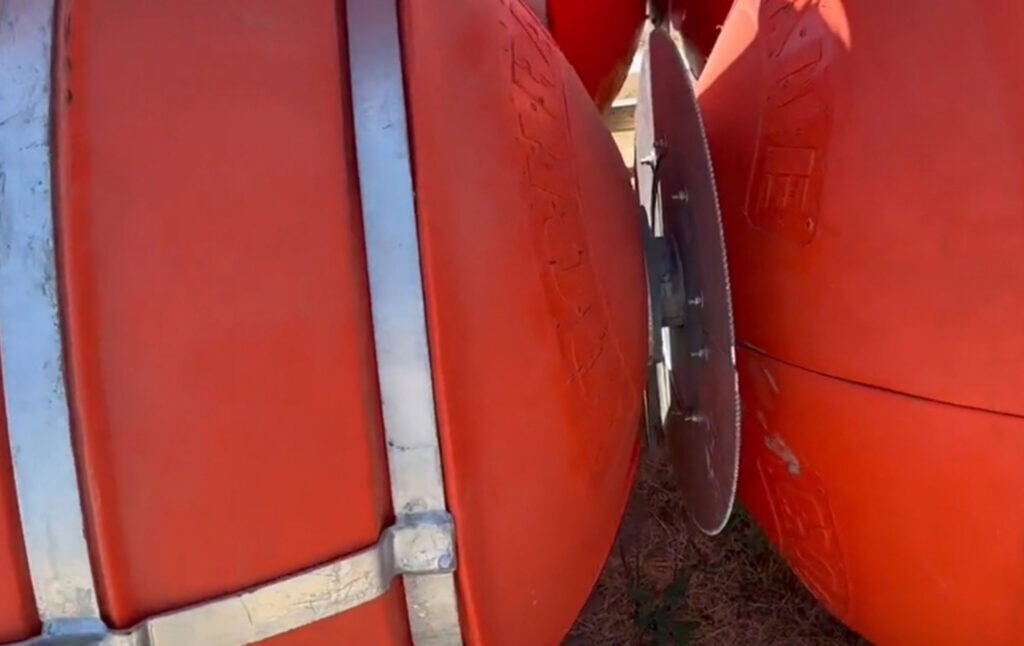
You Either See Everyone Else As a Human Being Or You Don’t
It’s obviously morally abominable to booby-trap the border with razors. But some people think desperate migrants deserve whatever cruelties we inflict on them.
When I recently saw a video of the buoys that Texas governor Greg Abbott has installed in the Rio Grande to thwart the passage of migrants, I thought it must be fake. The buoys appear to be deliberately equipped with sharp sawlike sprockets designed to slice up anyone who tries to clamber over them. “Those can’t be real,” I thought. “Even for Texas.”
But no. It appears they’re indeed real. I overestimated the humanity of the governor of Texas. He is indeed trying to keep immigrants from crossing into Texas by threatening to slice them to pieces, both with the saw-buoys and razor wire, if they should try to cross over illegally.
The Week reports that the methods are controversial locally, but if you want a depressing window into the souls of some of your fellow Americans, have a look at the comments on social media, many of which are firmly insistent that anyone carved up by a razor-buoy deserves exactly what they get. A sample:
- Isn’t the point of border security to dissuade people from crossing the border?
- Oh no, let’s not do anything to stop the drug and human traffickers. That would be inhumane.
- Stop coming here illegally. How about that! There would be no need for extreme measures. But it’s clear, you don’t care about secure safe borders.
- It’s very simple…Do not try to cross over into our country illegally and then there’s no problem with injuries or harm.
- It they don’t try to cross like they don’t get hurt. [sic]
- This is the right thing to do to stop this invasion. More please.
- Then don’t cross the rio grande?
- If you don’t want to get gouged by saw teeth, then don’t try to cross the border illegally. Simple!
- If it keeps people from crossing illegally, then I’m all for it. Nations have borders and for centuries, barriers have been placed to keep citizens safe. If someone gets hurt by one of these things, they did it to themselves, just like barbed wire and other kinds of things used today.
- MORE BORDER BUOYS!
There are thousands more, all similar. For these commenters, there is nothing “barbaric” at all about intentionally building a device to slice up migrants. In fact, in their moral framework, Abbott is not actually the one hurting anyone. They are hurting themselves, because they choose to cross. Many commenters said there was “no difference” between the razors in the buoys and any fence with concertina wire on it. Some expressed the view that anyone who objects to the saw-buoys should have no problem letting unauthorized migrants sneak into their house at night. (This is a common anti-immigration talking point, that whatever limits we place on people entering our homes are also justified against people entering the country.)
Now, in some ways I don’t know how to respond to these comments with anything except despair. To me, it is self-evident that it is wrong to injure desperate migrants (including little kids) and let them bleed to death or get infected (by whatever’s in that river water), purely for the “crime” of crossing an arbitrary geographic line in order to escape poverty. If you aren’t repulsed by the buoys, I don’t really know what to tell you, except that I find injuring people more abominable than you apparently do. I don’t see in these comments any compassion or empathy, in fact all I see are excuses for why we don’t need to have compassion or empathy, why any injuries that occur as a result of the placement of the buoys are not the responsibility of those who placed them. It is very hard to make an intellectual argument for why you ought to care about what happens to other people. I could invoke the Golden Rule; personally, if I were fleeing desperate conditions, I would not like to be cut by blades, and so I believe in not cutting people with blades. But of course, the commenters will simply reply: “I obey the law, and if I disobeyed the law, I would expect to be treated just this way.” So much for the Golden Rule. (Of course, most of the people who say this were probably born into quite different circumstances than the people fording the Rio Grande, so it happens to be easier for them to “obey the law.”)

Some of the arguments can actually be responded to, though. There is at least some difference between the buoys and ordinary razor-wire, that I think makes the buoys more unconscionable. Ordinary razor wire looks like razor wire, whereas the blades here are hidden, meaning that people might find out about them only when they try to climb over the buoys and then catch themselves unexpectedly on the sharp piece. Many defend the buoys as a deterrent, but it’s only a deterrent if people know what they’re in for. I don’t think most people expect to be injured by a buoy, so there is a special kind of cruelty to a device like this.
That said, I don’t think there should be razor wire at the border, either, because I have a general principle that it’s wrong to intentionally cause injury to someone who is not themselves doing any harm. I actually see very few legitimate uses for razor wire fencing. Perhaps around power stations, where the threat of injury is actually to keep people from causing themselves even worse injury by entering a dangerous facility. But some online commenters mentioned “prisons” and their barbed wire fencing as a legitimate use case, which raises the question: in this example, is the U.S. the “prison” or is Mexico?
It’s worth responding to the oft-invoked comparison between protecting one’s home from intruders and having a militarized border. I don’t think the analogy is sustainable, because I think there is a critical difference between individuals and nations. I respect people’s personal boundaries, because I think that people have an entitlement to be free of intrusion into their homes. But nations, and national boundaries, strike me as much more of an arbitrary and unnecessary mental construct. If someone walks into my house and takes up residence on my sofa, it also affects me much more than if someone crosses a border thousands of miles away from where I live and takes up a job in a restaurant. (And anyway, I wouldn’t install booby-traps to maim strangers who try to wander into my yard, even if I would prefer that they not do that.)
It’s also worth responding to the commenter who said that “Nations have borders and for centuries, barriers have been placed to keep citizens safe.” This is entirely misleading. While there are plenty of examples of historical barriers, they were certainly not any kind of norm. For instance, here’s the border between the U.S. and Mexico in 1900:

We see here the border between Nogales in Mexico and Nogales in Arizona. They were separated not by a barrier but by “International Street.” To leave the country, you crossed the street. This made quite a bit of sense. The alternative is that to get from your house in one part of Nogales to a store in another part of Nogales, you’d need to have your passport checked! That seems a little ridiculous. It’s the same place! But in our new world of militarized borders, this absurdity has become the norm. And it’s getting worse, with border walls proliferating around the world. It’s totally unnecessary, though. We could easily have a world of free movement between nation-states (the EU has demonstrated this, even if Britain foolishly withdrew itself from the experiment), where it is once again just as easy to pass between Nogales and Nogales (or Laredo and Nuevo Laredo) as it is to pass between Texas and New Mexico.

We should not just view the buoys as cruel, then, but also see militarized borders as entirely undesirable, and move toward the complete global free movement of people. But to do that, we will need people to be more empathetic towards those who actually pick up and move. People like the above-cited commenters don’t seem to understand or care why people make dangerous trips across the Rio Grande. They might want to think for a minute about the fact that being an unauthorized immigrant within the United States is a pretty tough life, and the migrants who come here (even children!) are likely to work incredibly difficult jobs for low pay, many of them in extreme heat. Considering how hard life will be if they succeed in crossing the border, maybe think about how desperate their circumstances must have been for them to make the attempt, with all the known risks. These are people who, often fleeing things like gang violence, rape, corruption, lack of educational opportunities, and homophobia in their home countries, want a marginally decent life for themselves and their families in a country that is more than capable of providing it. Personally I think it would be monstrously selfish to deny people that opportunity when it comes at virtually no cost. So I don’t see the influx of people at the southern border as a “crisis” or “invasion” that needs to be stopped. I think we just need to figure out how to integrate newcomers into our society successfully, as we have done for hundreds of years.
But it disturbs the hell out of me when I read comment after comment saying that booby traps are a fine way to greet the tired, poor “huddled masses” who yearn for a taste of that great “American freedom.” What can you even say to a person who is so untroubled by barbarism? You either see everyone else as a human being, or you don’t. But to a disturbingly large number of Americans, the only people we will take as neighbors are those who had the good fortune to be born on the right patch of Earth. The rest should be kept out with violence.




